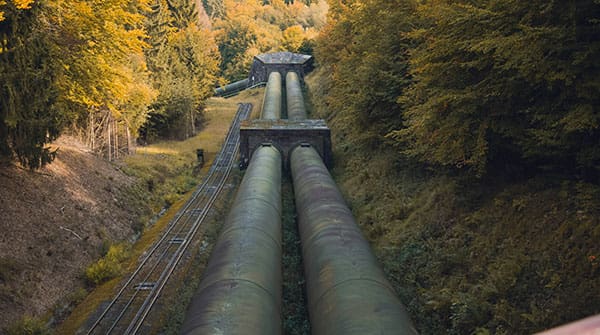Canada can easily help Europe achieve energy security by utilizing our abundant oil and natural gas reserves
 With its significant undeveloped oil and natural gas reserves, Canada can do much more to contribute to Europe’s energy security by filling the supply gap that sanctions on Russian energy created. Unfortunately, the federal government is continuing in its determined efforts to strangle the oil and natural gas industry in pursuit of a rapid energy transition that is unlikely.
With its significant undeveloped oil and natural gas reserves, Canada can do much more to contribute to Europe’s energy security by filling the supply gap that sanctions on Russian energy created. Unfortunately, the federal government is continuing in its determined efforts to strangle the oil and natural gas industry in pursuit of a rapid energy transition that is unlikely.
Natural Resources Minister Jonathan Wilkinson suggested that Canadian oil production could be ramped up to 300,000 barrels per day to help Europe. However, he sounded so half-hearted that it appeared unlikely he would take steps to make it happen.
More investment in Canadian energy development will produce jobs, energy security and tax revenue. Conversely, the federal government’s energy transition goal creates the following negative consequences for Canada:
 Photo by Quinten de Graaf |
| Related Stories |
| Energy East pipeline represents Canada’s salvation
|
| Canada can still help provide Europe with energy security
|
| The case for energy trade with Germany is strong
|
- Failure to help European countries accentuates the impact of their energy insecurity. Aren’t these countries Canada’s friends and allies?
- Lower economic growth due to reduced investment in energy development. Can the Trudeau government defend the ensuing but avoidable unemployment?
- Lower government income from energy industry taxes. Don’t we need this tax income to finance our ambitious social programs?
- Higher energy insecurity for Quebec and the Maritime provinces that rely on imported crude oil for almost half of their energy needs. Do we want to inflict avoidable disruption on Canadians who live in these provinces?
- Foregoing the opportunity to invest energy industry profits in cleantech projects. Don’t many Canadians want to pursue the energy transition at an achievable pace?
Immediate actions Canada can take
Wilkinson and Minister of Environment and Climate Change Steven Guilbeault’s comments about Canada’s constraints in responding to the European energy supply crunch were an embarrassment at best, and a misrepresentation at worst. These European countries are supposedly our allies. We’re leaving them in the lurch when we can help.
Here are the obvious immediate actions Canada can take to help because the crude oil infrastructure is in place:
- Ship crude oil through the St. Lawrence Seaway to Europe.
- Ship crude oil and gasoline from the Irving Oil refinery in New Brunswick to Europe.
- Ship Canadian crude oil from the U.S. Gulf Coast to Europe.
Intermediate-term actions Canada can take
Canada can approve multiple LNG export terminals on the East Coast. Investment in Canadian LNG infrastructure has the advantage of being closer to Europe than other LNG suppliers. The obvious projects that have been discussed or been in development for years are:
- Buckeye Partners’ Bear Head LNG project in the Strait of Canso – It’s fully permitted for construction and exports but has remained dormant for years due to low commodity prices.
- GNL Quebec Inc. Énergie Saguenay LNG Project – The Quebec government has rejected the proposal.
- The Pieridae Energy LNG project in Goldboro, Nova Scotia, is stalled.
- Repsol LNG import terminal in Saint John, New Brunswick – The proposal is to add export capability.
To support additional crude oil exports and new LNG export terminals, Canada will have to:
- Revive the Energy East oil pipeline proposal to displace imported crude oil, including Russian volumes, and provide capacity to ship crude oil to Europe.
- Add capacity to the TC Energy mainline pipeline for natural gas.
Longer-term actions Canada can take
Canada can encourage investment in Canadian energy development by:
- Signalling receptivity for additional offshore oil and natural gas development proposals. Fortunately, the federal government recently approved the Bay du Nord Oil Project.
- Signalling receptivity for crude oil and refined petroleum products export terminals.
- Reversing Quebec’s ban on oil and gas development.
How much Russian energy were European countries buying?
The significant and continuing European energy demand ensures the economic viability of new Canadian energy development and related export projects.
During the first 100 days of the war in Ukraine, from Feb. 24 to Jun. 3, the largest energy importers from Russia were China (€12.6 billion), Germany (€12.1 billion), Italy (€7.8 billion), Netherlands (€7.8 billion), Turkey (€6.7 billion), Poland (€4.4 billion), France (€4.3 billion) and India (€3.4 billion).
Even with these large energy purchases, these countries and others quickly changed suppliers.
Canada has an opportunity to contribute to Europe’s energy security. I hope we help our friends and capture the benefits from doing so.
Yogi Schulz has over 40 years of information technology experience in various industries. Yogi works extensively in the petroleum industry. He manages projects that arise from changes in business requirements, the need to leverage technology opportunities, and mergers. His specialties include IT strategy, web strategy and project management.
For interview requests, click here.
The opinions expressed by our columnists and contributors are theirs alone and do not inherently or expressly reflect the views of our publication.
© Troy Media
Troy Media is an editorial content provider to media outlets and its own hosted community news outlets across Canada.
